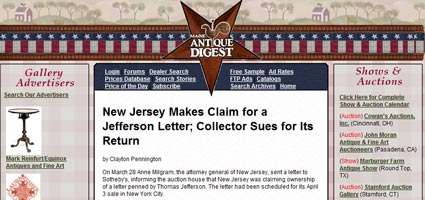There is an article at Maine Antique Digest about a dispute over a Thomas Jefferson letter consigned to the Sotheby’s auction house – the Attorney General of the state of New Jersey sent a letter to Sotheby’s prior to the auction event, claiming ownership of the document. Sotheby’s pulled the item and the consignor, the Robert Small 2007 Trust, has since filed suit against Sotheby’s for the return of the consignment. Sotheby’s position is that they will maintain possession of the document until they receive “concurring written instructions from all interested parties” or a “final non-appealable order from a court of competent jurisdiction”.
The full story can be read in its entirety at Maine Antique Digest:
This is a very interesting story in that it speaks to policies and legalities of auction houses to hold consignment pieces pending the conclusion of lengthy and costly legal battles over disputes concerning title and ownership claims.
As a point of reference, I’ve read the consignment agreement from an auction house that I’ve consigned with, and while a scenario such as this is not outlined as a contingency, a reading of the terms of their Master Consignment Agreement would lead me to believe that such an outcome might be possible under the same circumstances, but that is merely speculation and open to interpretation. In other words, one cannot rule it out based on the content of the agreement alone.
The primary area of concern with auction houses, as reflected in this agreement I have reviewed, is that of clear title and rights of possession and ownership. As such, their concern is that of potential liability in serving as the selling agent for the consignor. Given that the consignment agreement is written by the auction house, it is obviously drafted and constructed in a way to protect their company and their interests, and in a somewhat open-ended manner to apply to a variety of circumstances.
What makes this case surprising is the fact that Sotheby’s will not return the piece unless it’s conditions are met, and as I understand it, Sotheby’s is an agent of the consignor. Reading the Maine Antique Digest story, it does not seem as though New Jersey has proven ownership, but merely claimed it.
One additional point of concern that I would imagine for those who consign items for sale to auction houses is that of false claims of ownership, in that resolving them can be costly and obviously of no benefit the consignor.
Of course, the subject of this Sotheby’s dispute – the Jefferson letter – magnifies all of these issues in that it is highly valuable (six figures) as well as of historical importance. The 1807 Jefferson letter, “To the Representative of the people of New Jersey in their Legislature”, announces his decision to not seek a third term as President.
In any event, this is a story worth watching to learn of both the conclusion to this case as well as as other consequences (similar cases, changes in master consignment agreements at other auctions houses, etc.).
Thanks to Rick Spector of Stairway to the Stars for the link to the article.
Jason De Bord


